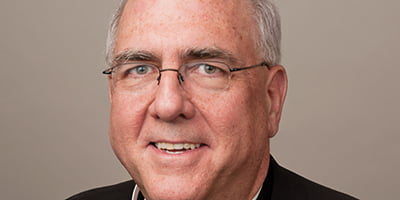Pope Francis never ceases to amaze at his ability to capture the attention of the secular press
by Archbishop Joseph F. Naumann
The Holy Father has a knack of focusing the media on an aspect of our Catholic faith that, despite having been spoken and written about by other popes, heretofore has been largely ignored.
The most recent case in point is the pope’s interview with Father Antonio Spadaro, SJ, editor of La Civiltà Cattolica. In the United States, the article appeared in America magazine. The interview was lengthy and wide-ranging.
At one point, Father An- tonio asked the Holy Father: “What does the church most need at this historic moment? Do we need reforms? What are your wishes for the church in the coming years? What kind of church do you dream of?” Pope Francis replied by saying that “the thing the church needs most today is the ability to heal wounds and to warm the hearts of the faithful.”
Pope Francis then compared the church to a field hospital after a battle. He said: “It is useless to ask a seriously injured person if he has high cholesterol and about the level of his blood sugars! You have to heal his wounds. Then we can talk about everything else.”
The Holy Father expressed again a predominant theme of his young pontificate: “The most important thing is the first proclamation: Jesus Christ has saved you. And the ministers of the church must be ministers of mercy above all.”
During these first months, Pope Francis has reminded us that the heart of the church’s mission is proclaiming Jesus as Lord. The Holy Father has exhorted the church to make our first priority bringing the mercy and love of Jesus to others. Not coincidentally, this
is very similar to one of the predominant themes of the immediate predecessor of Pope Francis.
Pope Benedict XVI taught frequently that the core of our Catholic faith is not our doctrines
and dogmas — important as our creed and catechism are. Pope Benedict cautioned that the essence of Catholicism is not embracing a moral code or living an ethical life. Pope Benedict emphasized repeatedly that the heart of Catholicism si an encounter with a person, the person of Jesus Christ.
Similarly, Pope John Paul II began his pontificate by exhorting each member of the church to be not afraid to open wide the doors of our hearts to Jesus Christ!
Is this not precisely what Pope Francis is now saying? Moreover, when Pope Francis reminds us “mercy above all,” how can we not hear the echo of John Paul II’s promotion of Divine Mercy? During the interview, Pope Francis addressed a range of diverse issues — everything from what music he enjoys and what books are his favorites to how his Jesuit formation will influence his leadership style.
However, what I found most fascinating was the very beginning of the interview. Father Antonio asked the pope: “Who is Jorge Mario Bergoglio?” Father Antonio said that the Holy Father seemed not to expect this question.
After reflecting for a while, Pope Francis responded: “I do not know what might be the most fitting description. I am a sinner. This is the most accurate definition. It is not a figure of speech, a literary genre. I am a sinner. Yes, perhaps I can say that I am a bit astute, that I can adapt to circumstances, but it is also true that I am a bit naive. Yes, but the best summary, the one that comes from the inside and I feel most true is: I am a sinner whom the Lord has looked upon.”
The pope went on to reminisce that before he was pope, while visiting Rome, he liked to go to the Church of St. Louis of France to contemplate the painting by Caravaggio — “The Calling of St. Matthew.” Pope Francis observed: “That finger of Jesus, pointing at Matthew. That’s me. I feel like him.
Like Matthew. It is the gesture of Matthew that strikes me: He holds on to his money as if to say, ‘No, not me! No, this money is mine.’ Here, this is me, a sinner on whom the Lord has turned his gaze.”
Why does the pope believe the best description he can give of himself is the title, sinner? He assured us that he was not just being poetic. His self-description is very much related to what the pope believes should be the first priority of the church — to proclaim Jesus as Lord and Savior.
If we fail to acknowledge our sinfulness, then we have no need for a redeemer. It is only the realization of our sin that allows us to experience the magnitude of God’s love revealed in his son, Jesus Christ.
Last Friday was the feast of St. Francis of Assisi, the saint that the Holy Father chose as the patron for his pontificate. Let us pray for Pope Francis that the Lord may use him to renew and reinvigorate the church today, much like Francis of Assisi did in his time.
I hope all of us will come to cherish the reality that we, too, are sinners. For it is only then that we can open our hearts to experience the depth and breadth of God’s love and mercy for us! Let us accept the invitation of Pope John Paul, Pope Benedict and now Pope Francis to open wide the doors of our hearts to Jesus Christ, Our Lord and Redeemer.


